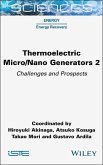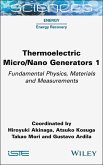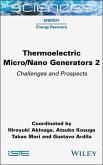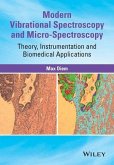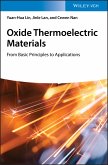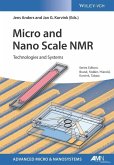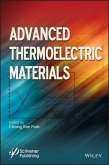Thermoelectric Micro / Nano Generators, Volume 1 (eBook, ePUB)
Fundamental Physics, Materials and Measurements
Redaktion: Akinaga, Hiroyuki; Ardila, Gustavo; Mori, Takao; Kosuga, Atsuko


Alle Infos zum eBook verschenken

Thermoelectric Micro / Nano Generators, Volume 1 (eBook, ePUB)
Fundamental Physics, Materials and Measurements
Redaktion: Akinaga, Hiroyuki; Ardila, Gustavo; Mori, Takao; Kosuga, Atsuko
- Format: ePub
- Merkliste
- Auf die Merkliste
- Bewerten Bewerten
- Teilen
- Produkt teilen
- Produkterinnerung
- Produkterinnerung

Hier können Sie sich einloggen

Bitte loggen Sie sich zunächst in Ihr Kundenkonto ein oder registrieren Sie sich bei bücher.de, um das eBook-Abo tolino select nutzen zu können.
This book explores a key technology regarding the importance of connections via an Internet of Things network and how this helps us to easily communicate with others and gather information. Namely, what would happen if this suddenly became unavailable due to a shortage of power or electricity? Using thermoelectric generators is a viable solution as they use the heat around us to generate the much-needed electricity for our technological needs. This first volume explores the computational and data-driven development of these thermoelectric generators, as well as the use of various abundant…mehr
- Geräte: eReader
- mit Kopierschutz
- eBook Hilfe
- Größe: 9.08MB
![Thermoelectric Micro / Nano Generators, Volume 2 (eBook, ePUB) Thermoelectric Micro / Nano Generators, Volume 2 (eBook, ePUB)]() Thermoelectric Micro / Nano Generators, Volume 2 (eBook, ePUB)142,99 €
Thermoelectric Micro / Nano Generators, Volume 2 (eBook, ePUB)142,99 €![Thermoelectric Micro / Nano Generators, Volume 1 (eBook, PDF) Thermoelectric Micro / Nano Generators, Volume 1 (eBook, PDF)]() Thermoelectric Micro / Nano Generators, Volume 1 (eBook, PDF)142,99 €
Thermoelectric Micro / Nano Generators, Volume 1 (eBook, PDF)142,99 €![Thermoelectric Micro / Nano Generators, Volume 2 (eBook, PDF) Thermoelectric Micro / Nano Generators, Volume 2 (eBook, PDF)]() Thermoelectric Micro / Nano Generators, Volume 2 (eBook, PDF)142,99 €
Thermoelectric Micro / Nano Generators, Volume 2 (eBook, PDF)142,99 €![Modern Vibrational Spectroscopy and Micro-Spectroscopy (eBook, ePUB) Modern Vibrational Spectroscopy and Micro-Spectroscopy (eBook, ePUB)]() Max DiemModern Vibrational Spectroscopy and Micro-Spectroscopy (eBook, ePUB)116,99 €
Max DiemModern Vibrational Spectroscopy and Micro-Spectroscopy (eBook, ePUB)116,99 €![Oxide Thermoelectric Materials (eBook, ePUB) Oxide Thermoelectric Materials (eBook, ePUB)]() Yuan-Hua LinOxide Thermoelectric Materials (eBook, ePUB)124,99 €
Yuan-Hua LinOxide Thermoelectric Materials (eBook, ePUB)124,99 €![Micro and Nano Scale NMR (eBook, ePUB) Micro and Nano Scale NMR (eBook, ePUB)]() Micro and Nano Scale NMR (eBook, ePUB)151,99 €
Micro and Nano Scale NMR (eBook, ePUB)151,99 €![Advanced Thermoelectric Materials (eBook, ePUB) Advanced Thermoelectric Materials (eBook, ePUB)]() Advanced Thermoelectric Materials (eBook, ePUB)215,99 €
Advanced Thermoelectric Materials (eBook, ePUB)215,99 €-
-
-
Dieser Download kann aus rechtlichen Gründen nur mit Rechnungsadresse in A, B, BG, CY, CZ, D, DK, EW, E, FIN, F, GR, HR, H, IRL, I, LT, L, LR, M, NL, PL, P, R, S, SLO, SK ausgeliefert werden.
- Produktdetails
- Verlag: John Wiley & Sons
- Seitenzahl: 256
- Erscheinungstermin: 12. Dezember 2023
- Englisch
- ISBN-13: 9781394256402
- Artikelnr.: 69661028
- Verlag: John Wiley & Sons
- Seitenzahl: 256
- Erscheinungstermin: 12. Dezember 2023
- Englisch
- ISBN-13: 9781394256402
- Artikelnr.: 69661028
- Herstellerkennzeichnung Die Herstellerinformationen sind derzeit nicht verfügbar.
Hiroyuki AKINAGA, Atsuko KOSUGA and Takao MORI
Part 1 Introduction to Materials Development 1
Chapter 1 Strategies for Development of High Performance Thermoelectric
Materials 3
Takao MORI, Atsuko KOSUGA and Hiroyuki AKINAGA
1.1 Introduction 3
1.2 Selectively lowering the thermal conductivity 5
1.2.1 Utilizing nanostructuring and defects 5
1.2.2 Utilizing crystal structure and bonding 7
1.3 Enhancing the Seebeck coefficient/power factor 8
1.4 Outlook for materials development 11
1.5 References 12
Chapter 2 Computational and Data-Driven Development of Thermoelectric
Materials 17
Prashun GORAI and Michael TORIYAMA
2.1 General theory 18
2.1.1 Boltzmann transport theory 19
2.1.2 Relaxation time approximation 20
2.1.3 Thermoelectric properties 21
2.1.4 Defect theory 24
2.2 Applications 26
2.2.1 Transport calculations 26
2.2.2 Defect and doping calculations 40
2.2.3 Thermoelectric material search with high-throughput computations and
machine learning 45
2.3 Outlook 51
2.4 References 52
Part 2 Thermoelectric Materials 71
Chapter 3 Thermoelectric Copper and Silver Chalcogenides 73
Holger KLEINKE
3.1 Introduction 73
3.2 Binary copper and silver chalcogenides 75
3.3 Ternary and higher copper and silver chalcogenides 78
3.3.1 Minerals based on copper and silver chalcogenides 78
3.3.2 Tl-containing copper and silver chalcogenides 79
3.3.3 Ba-containing copper and silver chalcogenides 79
3.4 Conclusion 84
3.5 Acknowledgments 85
3.6 References 85
Chapter 4 Sulfide Thermoelectrics: Materials and Modules 93
Michihiro OHTA, Priyanka JOOD and Kazuki IMASATO
4.1 Introduction 93
4.2 Materials 94
4.2.1 Rare-earth sulfides 94
4.2.2 Layered sulfides 97
4.2.3 Pb-Bi-S-based systems 99
4.2.4 Cu and Ag sulfide-based superionic conductors 101
4.2.5 Tetrahedrites and colusites 103
4.2.6 Chevrel-phase sulfides 105
4.2.7 Chalcopyrite 106
4.3 Modules 107
4.3.1 Colusites 107
4.3.2 Cu and Ag sulfide-based superionic conductors 108
4.4 Summary and prospects 110
4.5 References 110
Chapter 5 A Concise Review of Strongly Correlated Oxides 125
Ichiro TERASAKI
5.1 Introduction to electron correlation 125
5.2 Electronic states of transition-metal oxides 129
5.3 3D transition-metal oxides 130
5.3.1 Co oxides 131
5.3.2 Cu oxides 135
5.3.3 Other 3D transition-metal oxides 136
5.4 4D transition-metal oxides 136
5.4.1 Rh oxides 137
5.4.2 Ru oxides 139
5.5 Concluding remarks 139
5.6 References 140
Chapter 6 Nanocarbon Materials as Thermoelectric Generators 149
Tsuyohiko FUJIGAYA and Yoshiyuki NONOGUCHI
6.1 Introduction 149
6.2 Carbon nanotubes 150
6.3 Transport to materials studies 151
6.4 Chemical doping 156
6.5 Thermoelectric generators using CNT 162
6.6 TEG based on CNT sheet 163
6.7 TEG fabrication based on CNT-based ink 169
6.8 CNT yarn and their fabric 172
6.9 Conclusion 175
6.10 References 176
Part 3 Metrology of Thermal Properties 181
Chapter 7 Precise Measurement of the Absolute Seebeck Coefficient from the
Thomson Effect 183
Yasutaka AMAGAI
7.1 Introduction 183
7.2 Absolute scale of thermoelectricity 185
7.3 Measurement methods of the Thomson effect 189
7.3.1 Conventional method 190
7.3.2 New measurement methods: AC-DC method 192
7.4 Summary and outlook 195
7.5 References 196
Chapter 8 Thermal Diffusivity Measurement of Thin Films by Ultrafast Laser
Flash Method 201
Tetsuya BABA, Takahiro BABA and Takao MORI
8.1 Introduction 201
8.2 Laser flash method and ultrafast laser flash method 203
8.2.1 Laser flash method 203
8.2.2 Ultrafast laser flash method 205
8.3 Basic equation for data analysis 209
8.3.1 Response function method 209
8.3.2 Uniform single layer 212
8.3.3 Quadruple matrix 212
8.3.4 Thin film/substrate model 213
8.3.5 Temperature response after periodic pulse heating 216
8.4 Analysis of observed temperature response 222
8.4.1 Picosecond pulsed light heating 222
8.4.2 Nanosecond pulsed light heating 224
8.5 Metrological standard and traceability for measurements of thin film
thermophysical properties 224
8.6 Application of measurement from industrial to basic physics 225
8.7 References 226
List of Authors 233
Index 235
Summary of Volume 2 239
Hiroyuki AKINAGA, Atsuko KOSUGA and Takao MORI
Part 1 Introduction to Materials Development 1
Chapter 1 Strategies for Development of High Performance Thermoelectric
Materials 3
Takao MORI, Atsuko KOSUGA and Hiroyuki AKINAGA
1.1 Introduction 3
1.2 Selectively lowering the thermal conductivity 5
1.2.1 Utilizing nanostructuring and defects 5
1.2.2 Utilizing crystal structure and bonding 7
1.3 Enhancing the Seebeck coefficient/power factor 8
1.4 Outlook for materials development 11
1.5 References 12
Chapter 2 Computational and Data-Driven Development of Thermoelectric
Materials 17
Prashun GORAI and Michael TORIYAMA
2.1 General theory 18
2.1.1 Boltzmann transport theory 19
2.1.2 Relaxation time approximation 20
2.1.3 Thermoelectric properties 21
2.1.4 Defect theory 24
2.2 Applications 26
2.2.1 Transport calculations 26
2.2.2 Defect and doping calculations 40
2.2.3 Thermoelectric material search with high-throughput computations and
machine learning 45
2.3 Outlook 51
2.4 References 52
Part 2 Thermoelectric Materials 71
Chapter 3 Thermoelectric Copper and Silver Chalcogenides 73
Holger KLEINKE
3.1 Introduction 73
3.2 Binary copper and silver chalcogenides 75
3.3 Ternary and higher copper and silver chalcogenides 78
3.3.1 Minerals based on copper and silver chalcogenides 78
3.3.2 Tl-containing copper and silver chalcogenides 79
3.3.3 Ba-containing copper and silver chalcogenides 79
3.4 Conclusion 84
3.5 Acknowledgments 85
3.6 References 85
Chapter 4 Sulfide Thermoelectrics: Materials and Modules 93
Michihiro OHTA, Priyanka JOOD and Kazuki IMASATO
4.1 Introduction 93
4.2 Materials 94
4.2.1 Rare-earth sulfides 94
4.2.2 Layered sulfides 97
4.2.3 Pb-Bi-S-based systems 99
4.2.4 Cu and Ag sulfide-based superionic conductors 101
4.2.5 Tetrahedrites and colusites 103
4.2.6 Chevrel-phase sulfides 105
4.2.7 Chalcopyrite 106
4.3 Modules 107
4.3.1 Colusites 107
4.3.2 Cu and Ag sulfide-based superionic conductors 108
4.4 Summary and prospects 110
4.5 References 110
Chapter 5 A Concise Review of Strongly Correlated Oxides 125
Ichiro TERASAKI
5.1 Introduction to electron correlation 125
5.2 Electronic states of transition-metal oxides 129
5.3 3D transition-metal oxides 130
5.3.1 Co oxides 131
5.3.2 Cu oxides 135
5.3.3 Other 3D transition-metal oxides 136
5.4 4D transition-metal oxides 136
5.4.1 Rh oxides 137
5.4.2 Ru oxides 139
5.5 Concluding remarks 139
5.6 References 140
Chapter 6 Nanocarbon Materials as Thermoelectric Generators 149
Tsuyohiko FUJIGAYA and Yoshiyuki NONOGUCHI
6.1 Introduction 149
6.2 Carbon nanotubes 150
6.3 Transport to materials studies 151
6.4 Chemical doping 156
6.5 Thermoelectric generators using CNT 162
6.6 TEG based on CNT sheet 163
6.7 TEG fabrication based on CNT-based ink 169
6.8 CNT yarn and their fabric 172
6.9 Conclusion 175
6.10 References 176
Part 3 Metrology of Thermal Properties 181
Chapter 7 Precise Measurement of the Absolute Seebeck Coefficient from the
Thomson Effect 183
Yasutaka AMAGAI
7.1 Introduction 183
7.2 Absolute scale of thermoelectricity 185
7.3 Measurement methods of the Thomson effect 189
7.3.1 Conventional method 190
7.3.2 New measurement methods: AC-DC method 192
7.4 Summary and outlook 195
7.5 References 196
Chapter 8 Thermal Diffusivity Measurement of Thin Films by Ultrafast Laser
Flash Method 201
Tetsuya BABA, Takahiro BABA and Takao MORI
8.1 Introduction 201
8.2 Laser flash method and ultrafast laser flash method 203
8.2.1 Laser flash method 203
8.2.2 Ultrafast laser flash method 205
8.3 Basic equation for data analysis 209
8.3.1 Response function method 209
8.3.2 Uniform single layer 212
8.3.3 Quadruple matrix 212
8.3.4 Thin film/substrate model 213
8.3.5 Temperature response after periodic pulse heating 216
8.4 Analysis of observed temperature response 222
8.4.1 Picosecond pulsed light heating 222
8.4.2 Nanosecond pulsed light heating 224
8.5 Metrological standard and traceability for measurements of thin film
thermophysical properties 224
8.6 Application of measurement from industrial to basic physics 225
8.7 References 226
List of Authors 233
Index 235
Summary of Volume 2 239

